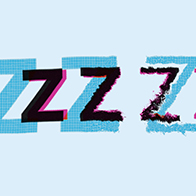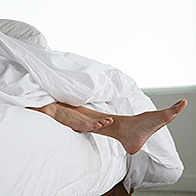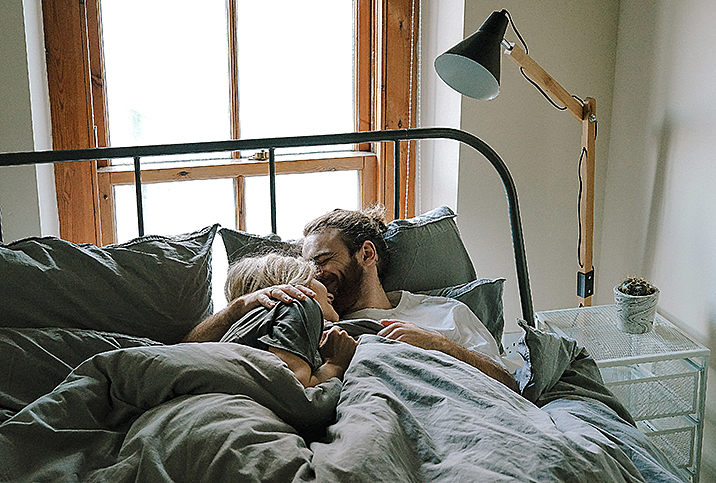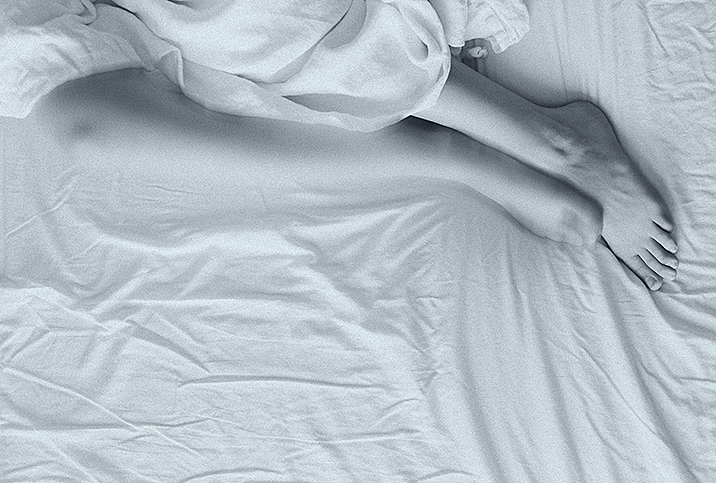Sleep and Your Sex Life: Too Little of One Can Mean Too Little of Both

Anyone suffering from a lack of sleep is likely familiar with the effects on their body. They're groggy, lethargic, irritable and unable to focus—or any combination of these feelings. Most of the time, they have to bear it, pepping themselves up with caffeine or, if they're lucky, taking a midday nap to revitalize.
While the occasional night of sleeplessness won't cause much trouble beyond the next day, chronic sleep deprivation can lead to myriad health issues, such as heart attack, diabetes, high blood pressure, stroke or heart failure. It's an understatement to say getting enough sleep is important.
Something we talk less about is how sleep deprivation can impact our sex lives.
"Sleep deprivation causes fatigue, low energy, irritability and lack of motivation to do things," said Amy Marschall, Psy.D., a Sioux Falls, South Dakota–based psychologist who created the Resiliency Mental Health website. "This does impact all areas of life, including libido. It's hard to have a high sex drive when you are feeling that way."
Both the causes and effects of sleep deprivation often impact other areas of life. Sleep deprivation can be the result of serious stress or anxiety, for example, and the lack of sleep might contribute to those anxious feelings. Perhaps you're falling behind at work and the stress keeps you up at night, but being tired the next day causes you to slip further behind. The cause-and-effect relationship quickly becomes cyclical.
Plus, you feel the physical factors associated with sleep deprivation. As the physical, mental and sexual hindrances from sleeplessness compound, they create an increasingly multifaceted series of issues.
For example, a decreased sex drive has further-reaching consequences than not having sex, said Pittsburgh therapist and social worker Todd Schachter, M.S.W., L.C.S.W., of Schachter Family Counseling.
"While all of these medical conditions can lead to problems with quality of life, it's the lack of sexual intimacy that seems to impact a romantic relationship more than medical or mental health conditions alone can cause," he said.
Anxiety affects sleep and sexual function
On most lists of common causes of erectile dysfunction (ED), it's normal to find anxiety as a leader, whether that anxiety is about sex itself or the inability to maintain an erection. In some relationships, this angst can cause a barrier.
"Anxiety over performance issues in sex can lead to failure of communication in partners when someone feels like the other will not understand their anxiety or are too embarrassed by sexual performance to discuss [it]," Schachter said.
Again, increased anxiety—potentially over both sexual performance and the relationship—can lead to insomnia, further perpetuating the debilitating cycle. Once the cycle begins, it can become difficult to escape.
Start talking
The first step toward a solution is obvious: Talk to your partner. Romantic relationships are meant to service partners' emotional needs. If you're having difficulty talking to your partner about issues such as anxiety, sleep, intimacy and your sex life, the odds are good that a flaccid penis isn't your only concern in the bedroom.
"Having an honest conversation over the sexual relationship can help reduce anxiety and create a safer place for partners to talk out their concerns and frustrations," Schachter said. "This is a great opportunity to not just increase a desire for sex but nonsexual intimacy, as well."
This step is especially important considering a possible solution to your sleep issues might lie within the sexual relationship.
"Sex causes our brains to release oxytocin, a very relaxing hormone, and reduces the body's level of cortisol, the stress hormone," Marschall said. "This can put you in a good mood if you have sex in the morning, or it can prime you for a good night of sleep if it is right before bed."
From a hormonal perspective, sleep benefits from sex. Of course, this all comes after that honest conversation. If you can't actually have sex in the first place, you can't experience the restful benefits.
Find a routine
Beyond communication and sex, people can create a number of habits to improve both the quantity and the quality of sleep.
"Having a consistent, relaxing routine around your bedtime can lead to better sleep, as can creating a relaxing sleep space and not using your bed for anything other than sleep," Marschall said.
Schachter explained nighttime routines don't have to be long, complicated productions. A few simple changes can create astounding results. Avoiding blue light before bed, for example, is something that isn't entirely difficult to do, yet many people fall asleep with the television on or scroll through feeds on their phones until their eyes grow heavy.
"You are more prone to staying up when a phone or tablet is close to your face," Schachter said. "It's possible to be tired but, after watching a video on these devices, that sleep never manifests in a manner that is helpful. If your strategy is to watch your phone until you just pass out, then the negative effects will already be present if you are aware of them or not. There is a huge difference between falling asleep and passing out."
Take an hour before bed to let your body wind down and prepare to rest, he continued. Change into comfortable clothes, brush your teeth, wash your face and create a space to relax. This process also means avoiding actions that will make you alert, including scrolling on your phone or doing something stimulating, such as completing work tasks.
If you're going to do something before bed, do something nondigital that puts your mind at ease. Reading a book or writing your thoughts in a journal is never a bad place to start. Or, if you've had an open conversation with your partner, sex before bed could help solve that sleeping problem, which in turn might help the sexual one.
"The goal should be to reduce anxiety, not let it get out of control," Schachter said.




















